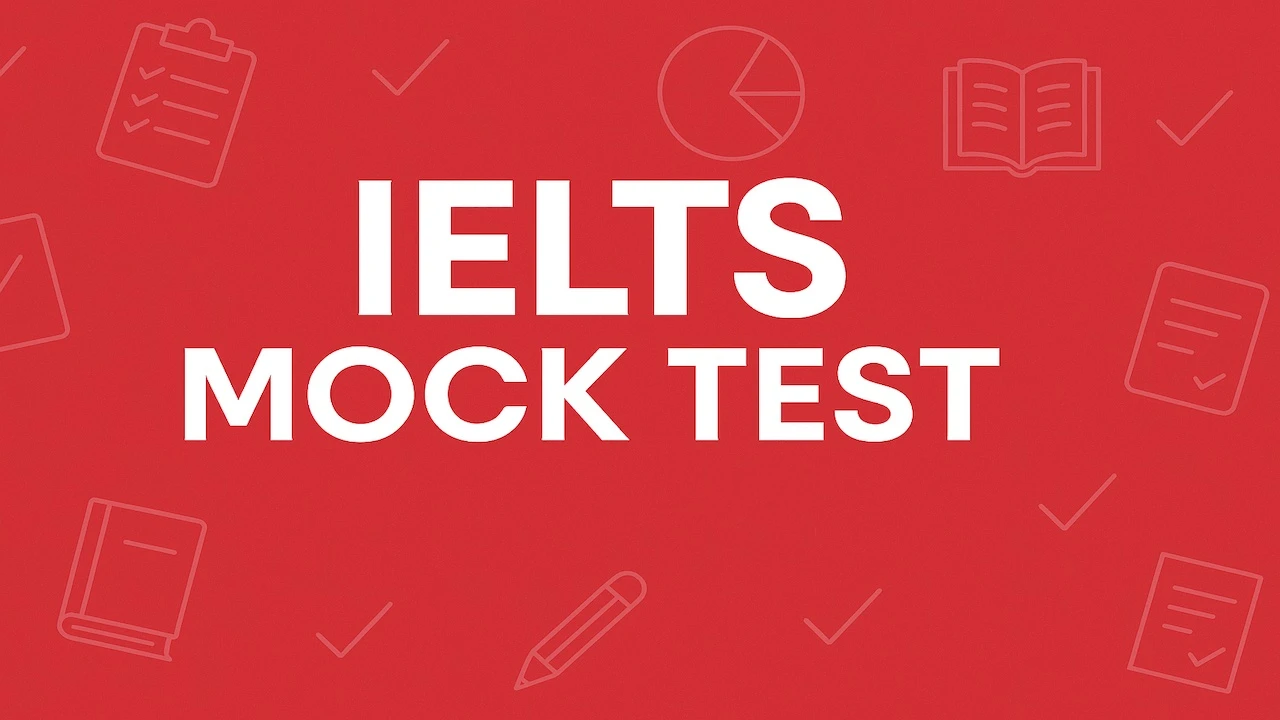Need to score well on your IELTS exam? Taking practice tests is crucial for success! Our comprehensive IELTS mock test guide provides everything you need to prepare effectively and boost your confidence for test day.
Are you preparing for the IELTS but unsure how ready you are? Do you want to know what to expect on test day? IELTS mock tests are the most effective way to prepare for your exam, helping you familiarize yourself with the format, timing, and question types while identifying your strengths and weaknesses.
IELTS Mock Tests
Understanding the IELTS Test Structure
Before taking mock tests, you need to understand what the actual IELTS exam involves:
| Component | Duration | Question Types | Skills Tested |
|---|---|---|---|
| Listening | 30 minutes | Multiple choice, matching, form completion, sentence completion, short answers | Listening for main ideas, specific information, details, opinions |
| Reading | 60 minutes | Multiple choice, matching information, summary completion, sentence completion, short answers | Skimming, scanning, reading for detail, understanding argument |
| Writing | 60 minutes | Two tasks: essay and graph/letter/report description | Task achievement, coherence, vocabulary range, grammatical accuracy |
| Speaking | 11-14 minutes | Three parts: introduction, cue card topic, discussion | Fluency, pronunciation, vocabulary range, grammatical accuracy |
IELTS Academic vs. General Training: What’s the Difference?
Depending on your goals, you’ll need to take either the Academic or General Training version:
| Test Version | Purpose | Reading Content | Writing Task 1 |
|---|---|---|---|
| Academic | University admission, professional registration | Academic texts, journals, magazines | Graph/chart/diagram description |
| General Training | Immigration, work, secondary education | Everyday texts, advertisements, instructions | Letter writing |
How to Take an IELTS Mock Test Most Effectively?
Follow these steps to get maximum benefit from your practice:
- Create exam conditions with proper timing and no distractions
- Complete all sections in one sitting when possible
- Use official or high quality practice materials for accuracy
- Time yourself strictly as you would in the real exam
- Score your test using official IELTS band descriptors
- Analyze your mistakes carefully after completion
How to Score Your IELTS Mock Test?
Understanding the band score system is crucial for self assessment:
| Band Score | Skill Level | Description |
|---|---|---|
| 9 | Expert | Complete operational command of English |
| 8 | Very Good | Fully operational command with only occasional inaccuracies |
| 7 | Good | Operational command with some inaccuracies |
| 6 | Competent | Generally effective command with some inaccuracies |
| 5 | Modest | Partial command with many inaccuracies |
| 4 | Limited | Basic competence limited to familiar situations |
| 3 | Extremely Limited | Conveys and understands only general meaning |
| 2 | Intermittent | No real communication except for basic information |
| 1 | Non User | Essentially no ability to use the language |
| 0 | Did Not Attempt | Did not answer the questions |
How Long Should You Prepare With Mock Tests?
The ideal preparation timeline varies by starting level:
| Current English Level | Recommended Preparation Time | Number of Mock Tests |
|---|---|---|
| Beginner (CEFR A1-A2) | 6+ months | 15+ mock tests |
| Intermediate (CEFR B1-B2) | 3-6 months | 10-15 mock tests |
| Advanced (CEFR C1-C2) | 1-3 months | 5-10 mock tests |
Target Band Scores for Different Purposes
Different institutions and countries require different minimum scores:
| Purpose | Typical Band Score Requirement |
|---|---|
| University Undergraduate | 6.0-6.5 overall |
| University Postgraduate | 6.5-7.5 overall |
| Medical Professionals | 7.0-7.5 overall |
| Immigration to Australia | 6.0-7.0 overall |
| Immigration to Canada | 6.0-6.5 overall |
| Immigration to UK | 4.0-7.0 overall |
| Immigration to New Zealand | 5.5-6.5 overall |
IELTS Preparation Schedule Template
A structured approach leads to better results:
| Week | Focus Areas | Mock Tests |
|---|---|---|
| Week 1-2 | Familiarization with test format, initial assessment | 1 full mock test |
| Week 3-4 | Intensive listening and reading practice | 2 section specific tests |
| Week 5-6 | Writing Task 1 and speaking Parts 1-2 | 2 section specific tests |
| Week 7-8 | Writing Task 2 and speaking Part 3 | 2 section specific tests |
| Week 9-10 | Mixed practice and weak area focus | 2 full mock tests |
| Week 11-12 | Final preparation and review | 2 full mock tests |
IELTS Preparation Resources Beyond Mock Tests
Complement your practice tests with these additional resources:
- Grammar reference books for accuracy improvement
- Vocabulary builders focused on academic or general topics
- Podcasts and TED talks for listening practice
- News articles for reading speed and comprehension
- Language exchange partners for speaking practice
Test Day Checklist: What to Bring to Your IELTS Exam?
Be prepared with these essential items:
- Valid identification (passport for international students)
- Test confirmation letter or email
- Admission ticket with test details
- Stationery (pencils, eraser, sharpener)
- Water in a transparent bottle (if permitted)
Life After IELTS: How to Maintain Your English Skills
Your English journey continues after achieving your target score:
- Regular reading of English materials
- Watching films and series in English
- Participating in language exchanges or conversation groups
- Writing journals or blogs in English
- Taking advanced courses in academic or professional English
Frequently Asked Questions (FAQ)
An IELTS mock test is a practice exam that simulates the actual IELTS test format, timing, and question types to help candidates prepare effectively for the real exam.
Most candidates benefit from taking at least 5-10 full mock tests before their actual IELTS exam, depending on their starting proficiency level and target band score.
Official IELTS mock tests are available from Cambridge Assessment English, the British Council, and IDP IELTS websites, as well as in official IELTS preparation books.
High quality mock tests, especially official ones, can predict your score quite accurately if taken under proper exam conditions and scored correctly using official band descriptors.
While mock tests are valuable for practice and assessment, you also need targeted study of skills, strategies, vocabulary, and grammar to significantly improve your score.
Use a timer and strictly follow the time allocations of the actual test: 30 minutes for Listening (plus 10 minutes transfer time), 60 minutes for Reading, 60 minutes for Writing, and 11-14 minutes for Speaking.
References
- Cambridge English. (2023). The Official Cambridge Guide to IELTS. Cambridge University Press.
- British Council. (2023). IELTS Preparation. https://www.britishcouncil.org/exam/ielts/prepare
- IDP IELTS. (2023). IELTS Practice Materials. https://www.ieltsidpindia.com/prepare-for-ielts
- IELTS.org. (2023). Test format. https://www.ielts.org/for-test-takers/test-format
- Cambridge Assessment English. (2023). IELTS Band Scores. https://www.cambridgeenglish.org/exams-and-tests/ielts/results/
- British Council. (2023). IELTS Scoring in Detail. https://takeielts.britishcouncil.org/teach-ielts/test-information/scores-explained


